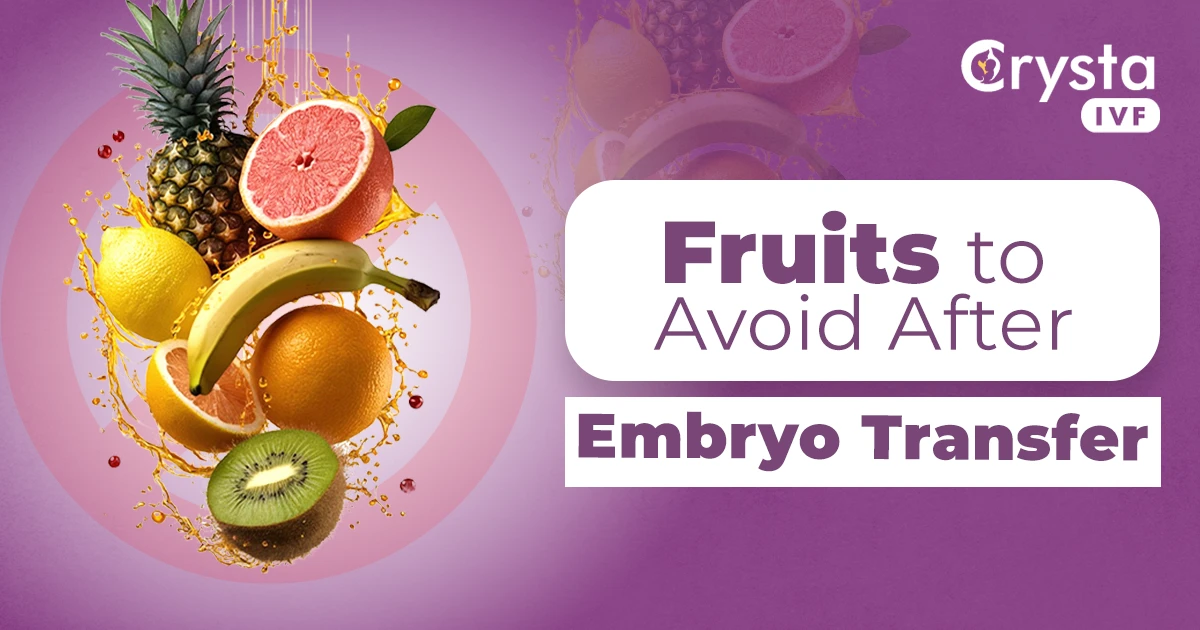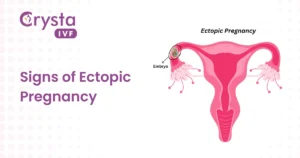After undergoing an embryo transfer, every small step counts toward making your IVF journey successful. Whether it is exercising, sleeping position or diet, everything matters during this phase. Hence, you must know what are the fruits to avoid after embryo transfer.
As you may know, embryo transfer is the final and most delicate stage of IVF, where the fertilised embryo is placed into the uterus to begin implantation. During this time, your body needs the right balance of nutrients, hormones, and rest to help the embryo settle and grow. Hence, what you eat can directly impact how your body responds after the transfer.
What you put in your body is equally important as your environment. Your food needs to be nourishing, healthy, and rich in minerals and vitamins. Your diet plays a crucial role in a successful pregnancy after embryo transfer. This is why you must know which fruits you must avoid after embryo transfer becomes an important part.
10 Fruits to Avoid After Embryo Transfer
During embryo transfer, your diet should focus on keeping the uterus calm, your hormones balanced, and your digestion smooth. While fruits are generally healthy and full of nutrients, a few of them may not be suitable right after embryo transfer.
Here are 10 fruits you must definitely avoid after embryo transfer:
1. Pineapple: The high citric nature of pineapple could be not-so-welcoming for your situation. Their high bromelain content might lead to thinning of the blood, unwanted.
- Safe Alternative: Pomegranate or orange (in moderation)
2. Unripe Papaya: Unripe papaya contains papain. It’s a compound that can potentially induce miscarriage. It’s advisable to avoid this fruit during pregnancy or when attempting conception due to its abortifacient properties.
- Safe Alternative: Ripe banana or apple for easy digestion.
3. Grapes (Especially Black): Grapes, especially the black ones, contain resveratrol, which can interfere with the implantation process.
- Safe Alternative: Watermelon or an apple in small portions.
4. Unripe Bananas: Despite being nutritious, bananas’ high sugar content can cause rapid blood sugar spikes, potentially creating an unsuitable environment for successful implantation.
- Safe Alternative: Have ripe bananas instead. They’re soft, rich in potassium, and help maintain energy levels.
5. Watermelon (in excess): We all know watermelon is one of the most refreshing fruits that exist. However, it can lead to bloating and gas, causing discomfort following an embryo transfer.
- Safe Alternative: Citrus fruits or a cucumber for hydration.
6. Dates: Dates are rich in iron and can increase the body’s core temperature. This can impact the delicate phase of the post-embryo transfer.
- Safe Alternative: Have them after 2- 3 weeks of pregnancy.
7. Mangoes: Known for their richness, mangoes can elevate body heat. There is a reason why it’s advised not to consume too many mangoes. It has also been observed that mangoes contain sorbitol, a laxative sugar content that can lead to loose motions. It can deplete essential fluid content in the body.
- Safe Alternative: Enjoy small portions of ripe mango occasionally or opt for berries and apples instead.
8. Kiwi: High in Vitamin C, kiwi acts as a natural diuretic, possibly leading to dehydration if not balanced with adequate water intake during fertility treatments.
- Safe Alternative: Choose less acidic fruits like a banana or a papaya (fully ripe).
9. Peaches: Recognised for their laxative effects, peaches might cause discomfort post-embryo transfer. Consider limited intake during this sensitive phase of fertility treatments.
- Safe Alternative: Pears or apples are gentler and nutrient-rich options.
10. Lemons: The high citrus content in lemons may trigger stomach acidity, potentially causing discomfort. Exercise moderation or dilution to minimize adverse effects, especially during sensitive fertility treatments.
- Safe Alternative: Take mild citrus, like sweet oranges or diluted lemon water in moderation if tolerated well.
It’s not our purpose to scare you but to inform you so you can make informed decisions. Remember that each IVF journey is as unique as yours. One fruit might be harmful to other women with embryo transfer, but it may be healthy and completely harmless for you.
Crysta IVF Fertility Recommendation on Fruits to Avoid After Embryo Transfer
“Every woman’s body responds differently after an embryo transfer, so there’s no one-size-fits-all diet. While fruits are generally healthy, certain ones like raw papaya, pineapple, or unripe bananas can sometimes affect implantation due to their properties. It’s always best to focus on easily digestible, nutrient-rich fruits and maintain a balanced diet during the early weeks after transfer.”
~ Dr. Kirti Gupta
Senior IVF Specialist at Crysta IVF Fertility Centre in Kanpur.
What are the Fruits to Eat After Embryo Transfer?
After an embryo transfer, choosing the right fruits can support implantation, digestion, and overall well-being.
The table below lists fruits that are safe to eat after embryo transfer, along with their benefits and tips on how to consume them for the best results.
| Fruit to Eat After Embryo Transfer | Benefits & How to Consume |
| Ripe Banana | Ripe bananas are rich in potassium, support energy and digestion. You can pair a banana with yoghurt or curd for better absorption. |
| Apple | Apple provides fibre and antioxidants, which support hormone balance in the body. Consume an apple by peeling the outer layer. |
| Pomegranate | Pomegranates are considered the best food to eat after embryo transfer. It helps improve blood flow to the uterus and supports the uterine lining. You can consume it raw or by fresh juice in moderation. |
| Berries (Strawberry, Blueberry, Raspberry) | Berries always support immunity and reduce oxidative stress in the body. You can consume berries in smoothies or directly. |
| Orange / Sweet Citrus Fruits | Citrus fruits are rich in vitamin C and boost immunity. Consume it in moderation and avoid too much lemon or sour orange |
Tips to Follow for a Healthy Post-Embryo Transfer Diet
After an embryo transfer, your body needs gentle care and a calm environment to support implantation. Here are some simple and practical tips to follow:
- Eat Small, Frequent Meals: Consuming large quantities of food can cause bloating and discomfort. Eating smaller meals throughout the day helps maintain steady energy levels and supports digestion.
- Focus on Protein-Rich Foods: Proteins are essential for hormone production and tissue repair. Include sources like eggs, yoghurt, lentils, and soft-cooked chicken or fish if you’re non-vegetarian.
- Include Fibre and Vitamins: Fruits (safe options) and vegetables provide essential nutrients and help maintain healthy digestion, preventing constipation during the post-transfer period.
- Stay Hydrated: Drink enough water, but avoid overhydration. Herbal teas like chamomile or warm water with honey can be soothing.
- Limit Caffeine and Processed Foods: Coffee, packaged snacks, and fried foods can affect hormone balance and digestion. Opt for home-cooked, fresh meals instead.
Summing It Up
Fruits are the greatest source of antioxidants, vitamins and minerals, but “ anything consumed in excess is bad”. Hence, keeping things in moderation is the key to a successful pregnancy. Also, before making any changes to your diet or routine, especially during IVF, can have negative health consequences.
At Crysta IVF, we understand the intricate needs of every IVF journey. Our experienced doctors and nutritionists will personalise your diet plan, carefully considering your unique situation and preferences. Through comprehensive consultations and guidance, we ensure you navigate this crucial phase with optimal nutrition and minimised risks.
For more information related to your diet or embryo transfer, book an appointment or call us at 893 893 5353
FAQs about Fruits to Avoid After Embryo Transfer
Which fruits should I avoid after embryo transfer?
Avoid fruits that may increase uterine activity or body heat, such as raw papaya, pineapple (especially core), unripe bananas, grapes, and unripe mangoes.
Can I eat a banana after an embryo transfer?
No, if you are having an unripe banana after embryo transfer, it might lead to an unsuitable environment for implantation. However, you can consume ripe bananas in moderation.
Can I eat watermelon after embryo transfer?
Yes, watermelon is safe in small portions. It helps with hydration, but avoid eating too much as it may flush nutrients too quickly.
Can I eat kiwi after embryo transfer?
No, Kiwi is acidic and it may cause mild stomach irritation in sensitive individuals.
Can I eat grapes after embryo transfer?
Yes, you can eat grapes after embryo transfer in moderation.
What are the foods to avoid after embryo transfer?
Avoid raw papaya, pineapple, unripe fruits, spicy foods, processed snacks, excessive caffeine, and alcohol after embryo transfer.
What are the positive signs after embryo transfer?
Positive signs after embryo transfer include mild cramping, light spotting, and breast tenderness. However, confirm pregnancy only with a blood test or a doctor’s consultation.
What to do the night before embryo transfer?
Get a good night’s sleep, stay relaxed, avoid heavy meals, and follow your doctor’s instructions regarding medications and hygiene.
Can I eat guava after embryo transfer?
Yes, ripe guava in small amounts is generally safe, but unripe or hard guava should be avoided as it may cause digestive discomfort or strain.
Can I consume dragon fruit after embryo transfer?
Yes, Dragon fruit is safe in moderation. It’s soft, rich in fibre and antioxidants.
What to do after embryo transfer to increase success?
To increase the chances of embryo transfer, you must focus on light nutrition, adequate rest, stress reduction, staying hydrated, and following your fertility specialist’s instructions carefully.
What vegetables should be avoided after embryo transfer?
Avoid raw or excessively cold vegetables, very spicy or gas-producing ones (like cabbage or cauliflower) in excess.




